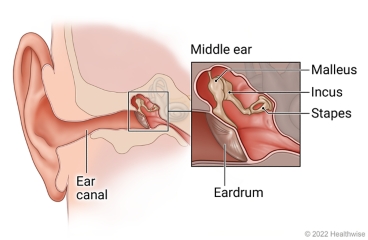Overview
Otosclerosis occurs when bone in the middle ear grows more than it should. The bones in the middle ear are called the malleus, incus and stapes. This condition usually happens with the stapes bone. This bone growth keeps the ear from working well and can cause hearing loss. In some cases, hearing loss can be severe.
Doctors do not know for sure what causes otosclerosis. It may run in families. A person who has a parent with this condition is more likely to get it. It may also be caused by changes in hormones that happen during pregnancy or by infection with certain viruses.
If you have hearing loss, hearing aids may help you hear better. In some cases, surgery is needed to restore hearing.
Follow-up care is a key part of your treatment and safety. Be sure to make and go to all appointments, and call your doctor if you are having problems. It's also a good idea to know your test results and keep a list of the medicines you take.


